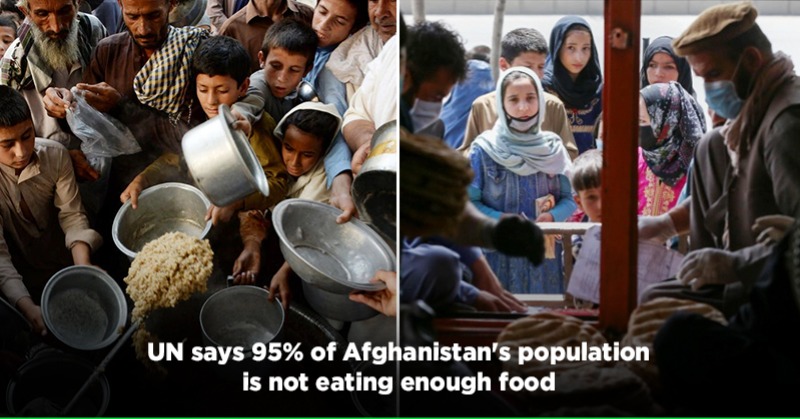13,726 newborns and mothers dying due to lack of nutrition, people selling their kidneys and even children for survival, and 23 million people facing starvation. That’s just a glimpse of the humanitarian and economic crisis that has hit the Taliban-ruled country of Afghanistan.
The Tales Of Misery
As per a 24-year-old former radio presenter from northern Afghanistan, Farahanaz, whose name has been changed to protect her identity, “It has been more than 24 hours since I had a ‘proper meal. As adults, we can manage, but when the kids ask for food, I don’t know what to tell them.” She told AlJazeera.
Choking back her tears, she further said. “There is a visible sense of desperation among millions of Afghans; people are selling their babies and young girls to survive. And yet Afghans are losing their lives.”

AlJazeera
When the family is able to eat, it’s often only bread, and sometimes with vegetables, accompanied by watered-down green tea. Sometimes there is sugar to put in the tea, which is a rare luxury these days, as they struggle to survive after Farahanaz, the sole breadwinner for the family of eight, lost her job after the Taliban took over the country.
Farhanaz’s family is among the 23 million Afghans facing starvation, in what has become a hunger crisis of “unparalleled proportions”, according to Dr Ramiz Alakbarov, deputy special representative of UN Secretary-General Antonio Guterres.

Reuters
Also Read: How Sri Lanka’s Economic Crisis Has Led To Used Cars Costing More Than A Luxury Flat
What The UN & Govt Records Says
Since the Taliban returned to power, nearly 60% of women working in the media have lost their jobs, according to the International Federation of Journalists, more than 90% of whom were sole family breadwinners.
According to the data shared by the Ministry of Public Health (MoPH) earlier this month, nearly 13,700 newborn babies and 26 mothers have died in 2022 due to a lack of nutrition.
“In Afghanistan, a staggering 95% of the population is not eating enough food. It is a figure so high that it is almost inconceivable. Yet, devastatingly, it is the harsh reality,” said Dr. Ramiz Alakbarov, deputy special representative of UN Secretary-General Antonio Guterres.
Dr Wahid Majrooh, the former Afghan minister of public health said “Mothers cannot pay for their antenatal and postnatal care, and as evident maternal mortality and morbidity rate is increasing tremendously, and is also affecting child mortality.”
Afghan parents are flocking to hospitals and clinics with “sick babies and children withered to their bones” as health workers struggle to provide necessary care and treatments.
Also Read: From Fuel & Medicine Shortage To People Juggling Multiple Jobs, Sri Lanka’s Crisis Worsens
For more of the latest economic and financial news, keep reading Worth. Click here

